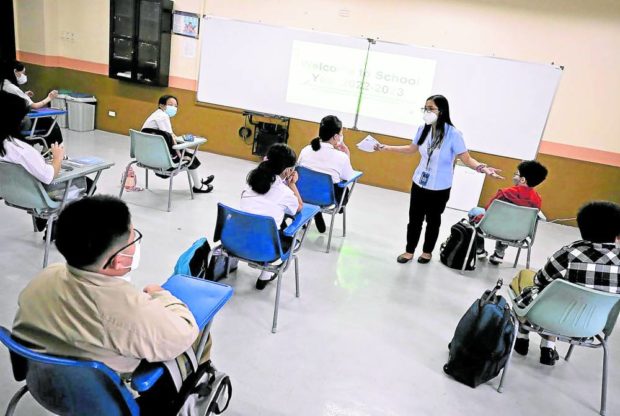
BACK TO SCHOOL Grade school students at Chiang Kai Shek College in Tondo, Manila, meet their teacher in an in-person class on July 12 after two years of distance learning due to health restrictions arising from the COVID-19 pandemic. (Photo by RICHARD A. REYES / Philippine Daily Inquirer)
MANILA, Philippines — With schools in the Asia-Pacific region, including the Philippines, reopening from prolonged closures amid the COVID-19 pandemic, the Asian Development Bank (ADB) has joined calls to extend the learning time of students to allow recovery from learning losses.
Doing so would “prevent lasting impacts on student progression, human capital formation, and livelihoods,” the ADB said in its report titled, “How to Recover Learning Losses from COVID-19 School Closures in Asia and the Pacific,” published on Monday.
The Manila-based multilateral lender noted that schools across developing Asia had been closed for an average of 272 instruction days, or 73 percent of school days between February 2020 and October 2021.
In the Philippines, 100-percent in-person classes would only resume in November after schools reopen in August.
“As a result, students in developing Asia are estimated to have lost what they would typically learn in nine-tenths of a school year. A recent review of studies worldwide found that, on average, students lost half a year’s worth of learning,” the ADB said, citing a recent World Bank report.
One way to recover from learning losses, it added, would be to extend students’ learning time to allow them to cover materials missed.
“This can take the form of hours added to the school day, weekend classes, and reducing the breaks between academic years and terms. Dedicating a clear time slot for remedial lessons is also important for effective implementation of targeted instruction,” the ADB said.
It cited prepandemic studies that showed extending instruction time generally showed improvements in student learning, although the results were context-specific.
“However, there are points of diminishing returns. Beyond a certain number of hours, boredom or fatigue can set in, students make less effort and are less able to concentrate, and absenteeism can rise,” the ADB added.
Summer school
It also suggested summer school programs to make up for learning deficiencies, saying that organizing these in a boot-camp format and complementing learning with extracurricular activities could make them more engaging.
“Learning losses due to school closures have been substantial in Asia and the Pacific. Efforts are urgently needed to recover those losses to avoid negative long-term impacts on student learning progression, well-being, future earnings, and economy-wide productivity. Young people’s economic prospects are in jeopardy at this critical juncture, and students will not catch up by simply returning to classrooms under the prepandemic status quo,” the ADB said.
Some teachers, however, have been urging Vice President and Education Secretary Sara Duterte to postpone the Aug. 22 school opening to September and to also reconsider her order for the full-time conduct of in-person classes starting Nov. 2.
On Monday, youth and teachers groups held a protest at the House of Representatives to likewise reiterate their calls for the prioritization of bills seeking a bigger national budget for education and higher pay for teachers.
Alliance of Concerned Teachers (ACT) spokesperson Vladimer Quetua said their low pay was not commensurate with their needs and their families,’ adding that some of them had to take side jobs to make ends meet.
ACT urged Congress to fast-track House Bill No. 203, intended to upgrade the salaries of teachers, and House Bill No. 1783 to increase the budget for education to at least 6 percent—the allocation standard according to the United Nations Educational, Scientific and Cultural Organization.
2-month break pushed
“We’re not against face-to-face classes,” Benjo Basas, Teachers Dignity Coalition chairperson, meanwhile, said in a statement.
His group has called for moving the school opening to September, to give teachers the two-month break they are entitled to under the law.
Basas said the Department of Education must also ensure the safety of students, teachers and school personnel by providing additional classrooms, water and sanitation facilities, and ventilation, as well as deploying health professionals to schools.
At the Senate, a resolution was filed for a review of the Kindergarten to Grade 12 (K to 12) basic education program with Sen. Sherwin Gatchalian citing the Pulse Asia survey he commissioned in June as chair of the Senate committee on basic education. It revealed that 44 percent of 1,200 adult respondents were dissatisfied with the program. —WITH REPORTS FROM JANE BAUTISTA AND MELVIN GASCON INQ
###—###
#Byline2
@bendeveraINQ
By Ben O. de Vera
@bendeveraINQ